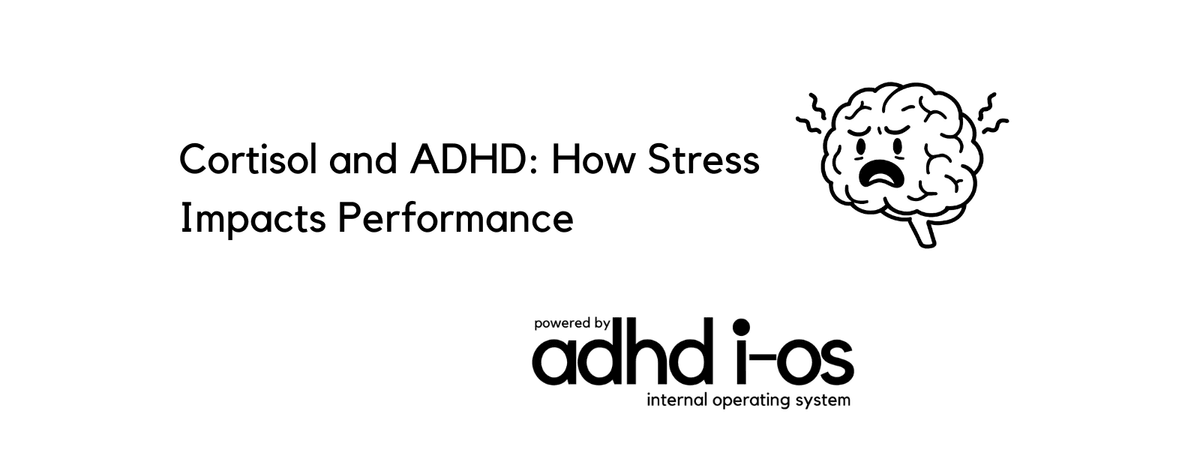Cortisol and ADHD: How Stress Impacts Performance
Cortisol and ADHD: How Stress Impacts Performance
Cortisol and ADHD: How Stress Impacts Performance
Ever sit down to focus and just…feel frozen? You’ve got the deadline. The task list. The urgency. But your brain? Total fog.
Your heart races, your thoughts scatter, and even simple decisions feel impossible. If you’ve ever wondered why stress seems to short-circuit your ADHD brain, this is your sign it’s not just in your head.
Let’s talk about cortisol, the body’s main stress hormone, and why managing it might be one of the most overlooked ADHD performance strategies out there.

Cortisol 101: What It Is & Why It Matters for ADHD
Cortisol is your body’s built-in alarm system. It’s regulated by the HPA-axis (hypothalamic-pituitary-adrenal axis) and gets released when you experience physical, mental, or emotional stress. In small amounts, it helps you focus, respond, and stay alert.
But for ADHD brains, the cortisol system is often out of sync. The difference matters because cortisol and dopamine interact directly in your brain’s executive control center: the prefrontal cortex.
And if that’s out of balance? Your focus, decision-making, and emotional regulation are affected.
What's Actually Happening in the ADHD Brain?
Here’s what stress does to your ADHD wiring:
- Cortisol regulates attention, memory, and emotion by influencing the prefrontal cortex, hippocampus, and dopamine system.
- In ADHD brains, chronic stress or overstimulation leads to cognitive overload, making it even harder to access working memory and executive function.
- And because the ADHD brain already struggles with emotional regulation and delayed gratification, the added impact of cortisol dysregulation can be significant.
So when people say to a person with ADHD, “Just calm down and focus”? It’s like telling a foggy windshield to defrost itself.
What the Research Shows
A growing body of research supports these patterns:
- Lower basal cortisol: A 2022 meta-analysis in Translational Psychiatry confirmed significantly reduced morning cortisol in youth with ADHD.
- Stress subtype patterns: ADHD brains’ reactions differ depending on their subtype. Those with ADHD-HI (hyperactive-impulsive) tend to show blunted cortisol reactivity, while those with ADHD-I (inattentive) often display a heightened response to stress.
- Genetic links: A 2023 study in Frontiers in Psychiatry found a bidirectional relationship between ADHD and genetically lower morning cortisol.
Both ADHD and non-ADHD populations experience impaired attention, working memory, and focus due to elevated cortisol during stress.
Why This Matters: The Cortisol Trap
The ADHD brain walks a fragile line:
- Too little cortisol? You feel unmotivated, flat, and foggy.
- Too much? You feel anxious, overwhelmed, and scattered.
This phenomenon leads to what's called allostatic load. This refers to the cumulative strain on your brain's stress systems over time. Over time, this strain damages the same brain regions responsible for emotional regulation, memory, and executive control.
So if you’ve ever cycled between total shutdown and stress-fueled spirals—it’s not a personality flaw. It’s a cortisol imbalance.
Strategies for Balancing Cortisol (and Boosting Focus)
ADHD i‑OS is all about practical tools grounded in neuroscience. Here’s what research suggests for regulating cortisol and protecting your mental energy:
Move Your Body
Aerobic and strength training have been shown to lower cortisol and boost dopamine, all while enhancing neuroplasticity and improving focus.
Practice Mindfulness
Mindfulness meditation, breathing exercises, and body scans can lower cortisol and improve prefrontal cortex function.
Prioritize Sleep & Routine
Consistent sleep and waking times help stabilize your HPA-axis rhythm, making it easier to regulate stress and attention throughout the day.
Eat for Brain Health
Whole foods, low sugar, omega-3s, and avoiding excess caffeine can support hormonal balance and reduce cortisol spikes.
Build in Buffer Zones
Spending time in nature, being around supportive people, or even petting an animal can calm your nervous system and reduce reactive stress.
What About Medication?
Some stimulant medications—like methylphenidate (Ritalin/Concerta)—may normalize the cortisol awakening response over time, helping reduce overall dysregulation.
But here’s the thing: medication alone isn’t a complete solution. The most effective treatment plans also include lifestyle changes that target hormone regulation, not just symptom suppression.
What’s Next in the Research?
- We need more studies on adults with ADHD, not just kids.
- There’s growing interest in how cortisol markers might be used to track ADHD treatment outcomes.
- Deeper understanding of subtype-specific patterns (inattentive vs hyperactive) could lead to more personalized care.
The bottom line? Stress regulation might become one of the most important areas of ADHD research in the next decade.
Cortisol is a Powerful Signal
Cortisol is a brain signal, not an enemy. But in ADHD, that signal gets scrambled easily. The trick isn’t to eliminate stress completely. It is important to establish recovery systems that help your brain remain flexible, alert, and focused.
Try just one of the cortisol-regulating habits above this week.
Then check in: how does your brain feel when it’s no longer in survival mode?
You might just notice that it’s a little easier to think.
Want More Tools Like This?
Join the adhd i‑os Community for real-life strategies, simplified brain science, and a space that actually gets how your brain works.
You’re not broken. You’re built differently—let’s build with that in mind.

